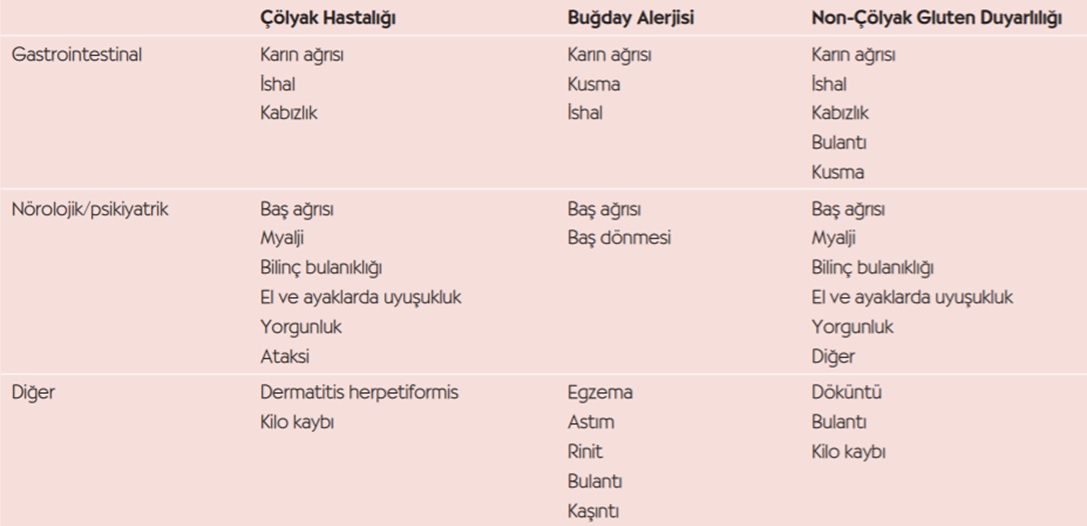Gluten is a water-soluble protein found in wheat, barley and rye.
In celiac disease, gluten causes immune inflammation in the small intestine. If celiac disease does not treated, it can cause the anemia, chronic fatigue, osteoporosis, impaired spleen, infertility, neurological disorders, skin rashes, and can lead to other conditions such as bowel cancer.
In some patients, even though blood tests and endoscopies are negative or normal, there are signs of celiac disease. This condition is called as non-celiac gluten sensitivity or gluten intolerance.
Symptoms may include conditions similar to celiac disease, such as abdominal pain, bloating, gas, diarrhea, drowsiness, or fatigue. Improvement in symptoms is also observed when gluten is removed from the diet, and these symptoms repeat when gluten-containing foods are started to be consumed.
Gluten Intolerance (Gluten Allergy, Non-Celiac Gluten Sensitivity)
There is not specific medical test that can be done to confirm the diagnosis of gluten intolerance. For this reason, in order to diagnose gluten sensitivity, it should be revealed that there is both celiac disease and wheat allergy. If the antibody test and small intestine biopsy are negative, celiac disease will be eliminated, and if the wheat allergy tests are negative, the possibility of wheat allergy will be eliminated. Non-celiac gluten sensitivity can be diagnosed by the formation of intestinal and extraintestinal symptoms with the consumption of gluten-containing foods and the regression of symptoms after the exclusion of these foods from the diet. Reactions can begin 48 hours after gluten has been digested and continue for much longer. The only treatment is gluten-free diet.
Wheat Allergy
Wheat allergy is an immune reaction to one of the hundreds of proteins in wheat. One of the white blood cells called T-cells sends immunoglobulin E (IgE) antibodies to “attack” the wheat fort he person who has wheat allergy. At this time, local tissues in the body also send natural chemical messengers that inform the rest of the body about the problem. This reaction occurs very quickly (within minutes or several hours) and various symptoms such as nausea, abdominal pain, itching, swelling of the lips and tongue, shortness of breath, or anaphylaxis (a fatal reaction) may occur in person. A person with a wheat allergy should avoid eating all types of wheat. But they have no problems digesting gluten in non-wheat sources. But there is also a possibility that the person is also allergic to wheat, has celiac disease, or gluten intolerant. The only treatment is wheat-free nutrition.

Relation Between Irritable Bowel Syndrome and Gluten
Irritable Bowel Syndrome is a functional bowel disease that mainly affects women of middle age. In other words, despite the obvious complaints of the patients, laboratory, radiological and endoscopic tests also do not show any obvious signs. In irritable bowel syndrome, there is a connection problem between the central nervous system and the digestive system. The digestive system reacts extravagantly to both internal and external stimuli. One of the nutrients that most often causes signs of irritable bowel syndrome is wheat. It is believed that the proteins and carbohydrates that make up the structure of wheat cause this effect. There are other proteins in wheat besides gluten. Amylase trypsin inhibitors are among the proteins that most stimulate the innate immune system. It is seen that some of the irritable bowel syndrome patients who are sensitive to wheat proteins may also be sensitive to soy, yeast, milk and legume proteins.
Some conditions that cause irritable bowel syndrome;
When gluten is consumed in celiac disease, inflammation and damage to cells occur as a result of immunological reactions. As the digestion and absorption of nutrients will be disrupted after this damage, a lack of certain substances in the body will occur over time. In other words, when celiac patients consume gluten-containing foods, the villi protrusions and folds on the intestinal mucosa are destroyed, and they decrease and shrink. Thus, the intestinal facial measurement is gradually reduced, and the food taken cannot be absorbed.
Fort the patients with irritable bowel syndrome, there is no obvious destruction or inflammation, as in celiac patients. For this reason, irritable bowel syndrome is defined as a functional disease in which a structural disorder cannot be detected by examination or standard diagnostic methods in the digestive tract.
Sinem Kınık
Food Engineer